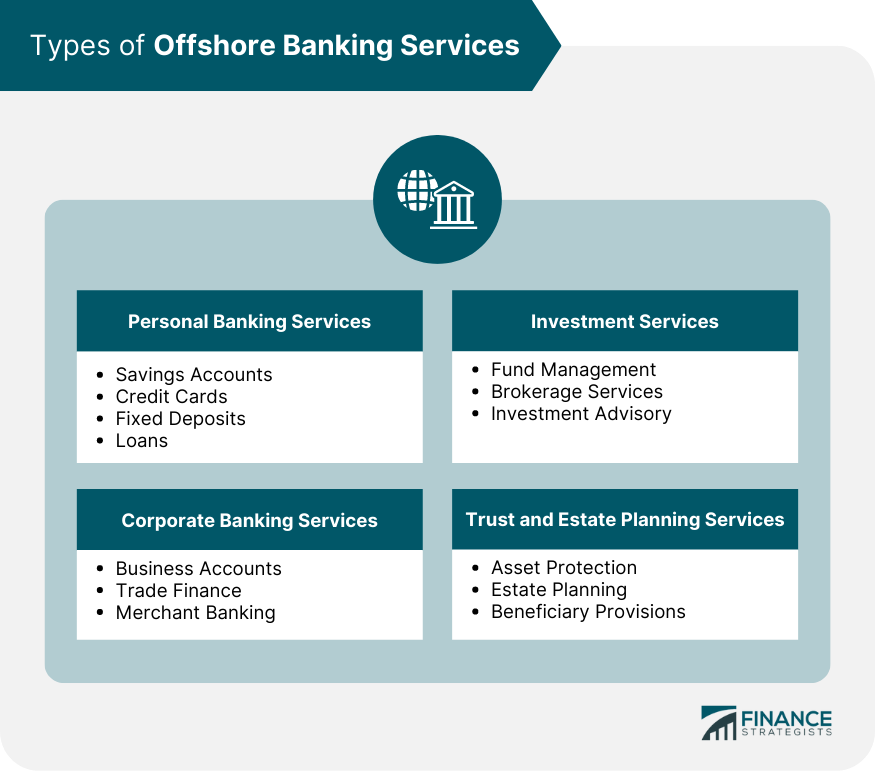Checking Out the Solutions Offered in Offshore Business Formations: What You Required to Know
Offshore business formations supply a variety of services made to promote company success while making sure conformity with legal demands. These solutions can include business enrollment, lawful advice, and arrangements for privacy via candidate directors. Furthermore, factors to consider around tax optimization and asset protection are critical. Recognizing these elements can considerably impact one's decision-making process. Nevertheless, the complexities of selecting the best jurisdiction and guiding with guidelines increase better inquiries. What should one consider following?
Recognizing Offshore Company Structures
What specifies an offshore firm structure? An overseas firm is usually registered in a foreign territory, typically characterized by beneficial governing atmospheres and privacy. These frameworks are created to offer legal separation between the firm's possessions and its proprietors, allowing a variety of financial and functional benefits. Offshore firms can be established as different types, including restricted liability companies (LLCs), companies, or depends on, relying on the regulatory framework of the selected territory.
Key features of these structures consist of boosted privacy, possession defense, and simplicity of worldwide company purchases. Furthermore, they typically require minimal neighborhood existence and can promote the management of investments throughout borders. The choice of a certain offshore jurisdiction can considerably affect the functional abilities and compliance requirements of the business. Overall, recognizing the intricacies of offshore business frameworks is vital for entrepreneurs and investors looking for to optimize their organization techniques.
Tax Advantages of Offshore Firms
Offshore business provide significant tax obligation advantages that can improve success and monetary efficiency for entrepreneur. Among the key advantages is the potential for decreased business tax rates, which can be especially less than those in the proprietor's home country. Several overseas jurisdictions provide tax obligation rewards, such as tax obligation holidays or exceptions on certain kinds of revenue. Furthermore, offshore business might gain from positive tax obligation treaties, permitting the decrease or elimination of withholding tax obligations on dividends, royalties, and interest. This can result in raised capital and better reinvestment chances. Some overseas entities can operate under a territorial tax obligation system, which only tax obligations income created within that jurisdiction. This framework can be particularly beneficial for companies engaged in worldwide trade or online services, enabling them to enhance their tax obligation commitments while preserving conformity with global guidelines. In general, these tax advantages can considerably add to long-lasting monetary success.
Privacy and Confidentiality Attributes
How can entrepreneur safeguard their sensitive info while gaining from international chances? Offshore company formations offer durable personal privacy and confidentiality functions that appeal to business owners seeking discretion (Offshore Company Formations). Lots of territories provide nominee solutions, enabling individuals to select 3rd parties as investors or supervisors, thereby concealing their identifications from public records
On top of that, rigorous data security laws in various offshore areas ensure that delicate info continues to be private. Offshore firms often take advantage of boosted financial personal privacy, with laws that secure client identifications and economic transactions.
Furthermore, using exclusive addresses for signed up workplaces reduces direct exposure to public scrutiny.
These personal privacy steps allow company owner to run with better confidence, knowing their sensitive data is safe and secure. By leveraging these attributes, entrepreneurs can concentrate on tactical growth chances without the constant concern of info direct exposure.
Possession Protection Techniques
While guiding through the complexities of global business, business owners have to focus on possession defense to protect their riches from possible dangers. Offshore firm formations offer durable strategies for minimizing exposure to lawful claims, creditor activities, and political instability. One efficient technique entails developing a restricted liability company (LLC), which separates personal properties from company responsibilities, consequently providing a guard versus legal actions.
In addition, business owners can use counts on to hold properties, ensuring they stay shielded from financial institutions and lawful disagreements. Territories with strong asset defense laws, such as Nevis or the Cook Islands, are usually preferred for their desirable regulations. Carrying out correct insurance plan and expanding investments better boosts protection, minimizing susceptability to market changes. Overall, using these techniques within an overseas framework not only advertises riches preservation however additionally cultivates long-lasting economic security, permitting entrepreneurs to focus on growth and technology without excessive concern over property direct exposure.

Opening Offshore Financial Institution Accounts
Opening up overseas savings account entails recognizing the various account types readily available, which can cater to various financial demands. Furthermore, the paperwork process is vital, as it frequently requires specific kinds of identification and evidence of house. This introduction will certainly make clear the alternatives and demands for individuals and businesses seeking to establish offshore banking relationships.
Account Types Offered
Offshore checking account been available in different types, each developed to satisfy different monetary demands and objectives. Individual accounts are tailored for individuals looking for personal privacy and here asset security, while company accounts facilitate service purchases and monitoring of firm funds. Multi-currency accounts are prominent among worldwide financiers, permitting deals across different currencies without too much conversion costs. Additionally, interest-bearing accounts offer passion on down payments, appealing to those wanting to expand their assets safely. Some financial institutions likewise supply financial investment accounts, supplying customers accessibility to various investment possibilities. Each account type may feature distinctive benefits and attributes, enabling clients to pick the one that straightens ideal with their financial strategies and goals. Recognizing these options is fundamental for efficient offshore banking.
Needed Paperwork Process
To successfully open up an offshore bank account, prospective customers should prepare a collection of specific papers that satisfy regulatory needs. This typically consists of a legitimate ticket or government-issued identification to confirm identity. Clients are additionally required to provide proof of house, such as an energy costs or bank declaration, dated within the last three months. In addition, a comprehensive description of the source of funds is essential to guarantee compliance with anti-money laundering regulations. Some financial institutions might request a service plan or recommendation letters, specifically for company accounts. Each territory may have one-of-a-kind needs; subsequently, speaking with an expert in overseas solutions is a good idea to establish all documentation is exact and total, assisting in a smoother account opening procedure.
Compliance and Regulative Factors To Consider
Maneuvering the complexities of conformity and regulative factors to consider is essential for any kind of entity pursuing overseas business formations. Entities must adhere to numerous international and neighborhood legislations that control monetary tasks, tax, and business governance. Key laws typically consist of anti-money laundering (AML) laws, understand your client (KYC) procedures, and coverage demands to guarantee transparency.
Firms must continue to be watchful regarding modifications in regulations that might impact their functional condition. Failure to abide can lead to serious penalties, consisting of fines or the dissolution of the business. Involving with lawful and financial professionals that concentrate on overseas regulations can provide essential assistance in guiding through these intricacies.
In addition, recognizing the implications of tax treaties and global agreements is fundamental for keeping conformity. Firms should focus on establishing durable compliance frameworks to reduce dangers and guarantee long-lasting sustainability in their offshore endeavors.
Choosing the Right Offshore Territory
Just how does one identify one of the most suitable overseas territory for business formation? The choice of jurisdiction is crucial and involves numerous aspects. One have to evaluate the lawful structure and laws governing business in possible jurisdictions. Favorable tax obligation routines, see this such as low or absolutely no corporate taxes, are typically a main consideration. In addition, the political security and online reputation of the jurisdiction play substantial functions in making sure the defense of possessions and conformity with worldwide criteria.
Moreover, the ease of access of financial solutions and the ease of doing business should not be ignored. A jurisdiction offering durable privacy provisions can also be helpful for those seeking privacy. Ultimately, evaluating the costs connected with company development, maintenance, and potential legal fees is important. By weighing these factors, one can make an educated decision, guaranteeing that the picked overseas territory aligns with their organization goals and operational requirements.

Often Asked Questions
Just how Long Does the Offshore Firm Formation Refine Typically Take?

The overseas firm development process generally takes anywhere from a couple of days to several weeks. Offshore Company Formations. Variables influencing this timeline include territory, documentation completeness, and certain provider associated with the formation procedure
What Are the First Costs Involved in Setting up an Offshore Firm?
The first costs for establishing an offshore company can differ extensively, usually encompassing registration charges, legal costs, and added fees for solutions like bank account setup and conformity, commonly completing numerous hundred to numerous thousand bucks.
Can People Type Offshore Companies Without Specialist Aid?
People can practically create overseas business independently; however, they frequently run into complex lawful and governing demands. click reference Offshore Company Formations. Expert assistance is suggested to browse these challenges effectively and ensure compliance with relevant legislations and guidelines
What Documents Are Needed for Offshore Company Registration?
The files needed for overseas company enrollment typically include recognition proof, an in-depth organization strategy, proof of address, and, in some jurisdictions, an affirmation of advantageous possession and resolutions from directors.
Are There Recurring Upkeep Fees for Offshore Business?
Ongoing maintenance charges for overseas companies are normally needed to guarantee conformity with neighborhood guidelines. These costs may consist of annual revival fees, signed up agent services, and bookkeeping, differing by territory and specific business framework.
